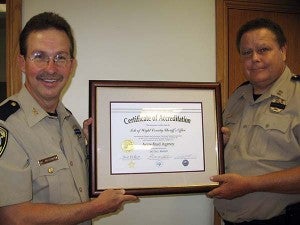IOW Sheriff’s Office earns high marks
Published 11:24 am Wednesday, May 28, 2014
ISLE OF WIGHT—Mark Marshall said that when he was campaigning to become the next sheriff of Isle of Wight County, part of his pledge was to bring the county office to full accreditation.

Isle of Wight County Sheriff Mark Marshall, left, and Capt. Joe Willard hold up the office’s Certificate of Accreditation. This is a first for the department, and Marshall intends to maintain the status. — STEPHEN H. COWLES | TIDEWATER NEWS
Done.
He recently returned from Martinsville with a certificate in hand — a first for the department.
Marshall added that the accreditation — A++ — is valid for four years.
“Now we just have to keep it,” he said with a wide smile.
But the sheriff is not worried. For one, he’s got office/accreditation manager Jimmie Minton to keep everyone on track. Then there’s the able-bodied staff that upholds the laws of the land, and they’ve evidently been doing so to the satisfaction of the Virginia Law Enforcement Professional Standards Commission.
Criteria for how Virginia law enforcement agencies should act in almost any case were established in the 1990s.
“Accreditation requires you to constantly keep up with these standards,” said Marshall, adding that there are 190 that can range from handling domestic abuse cases to hiring people.
“It’s everything — even how we collect, store and dispose of evidence,” he also said.
Writing reports is not enough to earn the recognition. Any law enforcement agency in Virginia that seeks that certificate has to prove training has been done, understood and followed.
Assessors from outside a department arrive to inspect and ensure. Such people came in March and spent a couple of days in Isle of Wight.
Though at one time insurance premiums were an incentive to earn accreditation, that’s apparently no longer available.
But another and more lasting benefit of following higher standards comes from improvements in service. For example, pursuits on the roads. If an incident seems to warrant chasing a suspect, a deputy must immediately report to the office of what’s going on and tell a supervisor. Questions to consider include why the pursuit is happening, what’s the speed and how are the road conditions. If anything could put people in an unsafe situation, there’s no justification or risk of a high-speed chase.
“It’s real introspective work and you make the changes if you believe in these tenets,” said Marshall.





